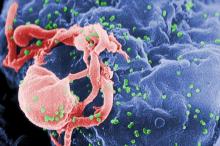Two novel HIV-1 vaccines produced significant humoral and cellular immune responses in healthy adults, according to a multicenter randomized trial published in Annals of Internal Medicine.
“Both heterologous and homologous adenovirus vaccine regimens are promising vaccination strategies,” said Dr. Lindsey Baden of Brigham and Women’s Hospital in Boston and her associates. Baseline immunity did not significantly alter immune responses, and second vaccinations of all regimens significantly boosted antibody titers, the researchers added.
Developing HIV vaccines remains a global priority, but only one of four prior strategies showed any promise, and efficacy was “modest and short-lived,” the researchers said. To assess the two novel HIV-1 vaccines, they randomized 217 healthy, uninfected adults to receive placebo or vaccines consisting of either adenovirus serotype 26 or serotype 35, each with an HIV-1 envelope A insert. Both vaccines were administered at a dose of 5 x 1010 viral particles and in homologous and heterologous combinations. The double-blinded trial was conducted in East Africa, South Africa, and the United States (Ann Intern Med. 2016 Feb 1. doi: 10.7326/M15-0880). The vaccines produced humoral and cellular immune responses in all populations, regardless of baseline vector immunity, said the investigators. The second vaccination boosted envelope A antibody titers about 20-fold in both the homologous and heterologous regimens. However, vaccine order seemed to matter in the heterologous regimen, as envelope A antibody titers were significantly higher when the adenovirus serotype 26 vaccine was given first instead of second.
T-cell responses were “modest” for all regimens, although they differed somewhat by regimen and were lower in East Africa than at other sites, the researchers reported. There were no serious vaccine-related adverse events. Because a 3-month vaccination schedule had similar immunogenicity as a 6-month schedule, the investigators recommended further studies of the durability of immune response with this shorter schedule.
The study was supported by the Ragon Institute, the National Institutes of Health, the International AIDS Vaccine Initiative, and the U.S. Agency for International Development. Dr. Baden reported receiving grants from the Ragon Institute, NIH, and the Bill & Melinda Gates Foundation, and involvement in HIV vaccine clinical trials conducted with NIH, HIV Vaccine Trials Network, International AIDS Vaccine Initiative, Crucell Holland BV/Janssen Pharmaceuticals, Military HIV Research Program, the Bill & Melinda Gates Foundation, and the Ragon Institute. Ten coinvestigators reported financial relationships with these and other nonprofit and pharmaceutical companies. Two coinvestigators also reported holding relevant patents.

